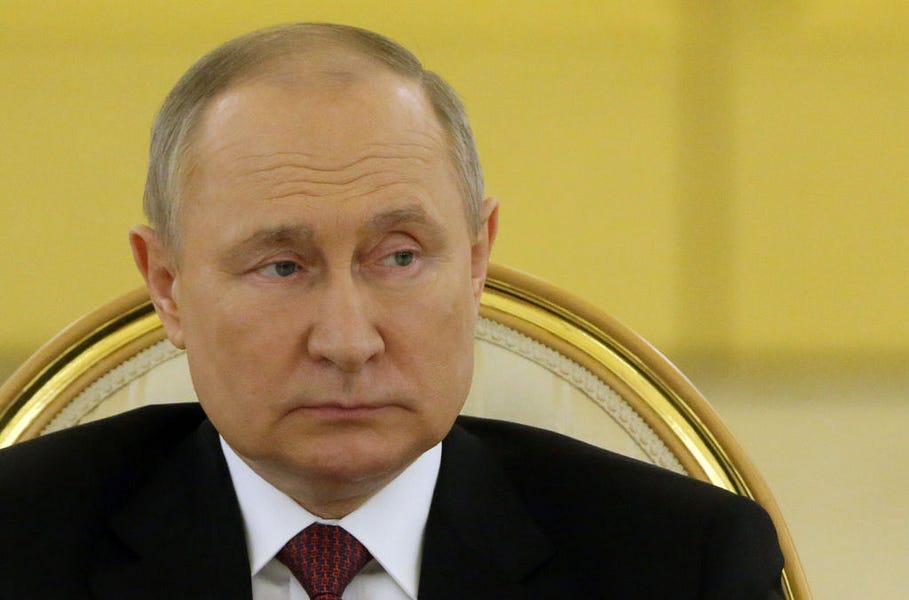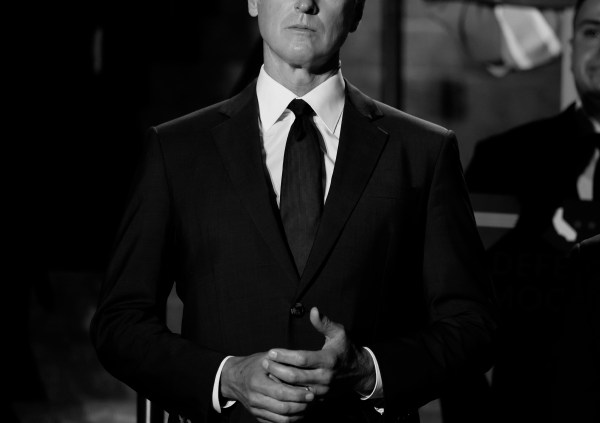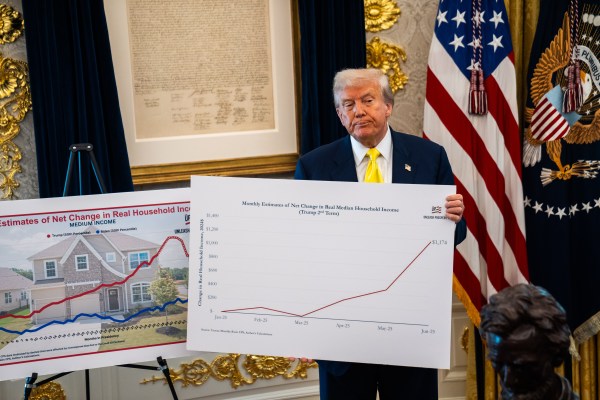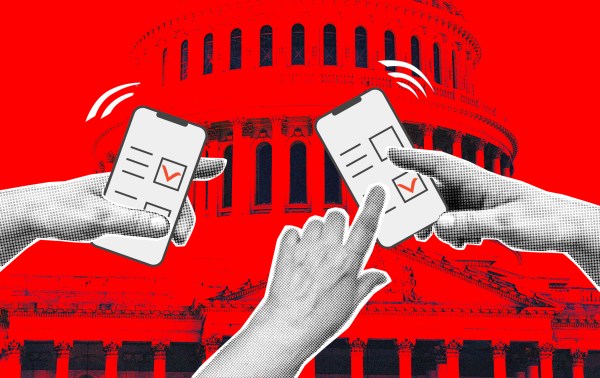Vladimir Putin made some revealing comments last week during a monologue before a Q&A session he gave to some young Russian entrepreneurs and scientists. He spoke about the deep purposes for his war in Ukraine, about the nature of sovereignty, and described a more expansionist vision of Russian policy than one normally hears from his lips—at least when he speaks to forums where Westerners are likely listening in. Putin’s stated beliefs here about the nature of sovereignty have some roots in Soviet propaganda and ideology, but also in Russian jingoism that is even older.
Putin began his talk with a small disquisition on sovereignty. The context for this was his segue to talk about “technological” and “economic sovereignty,” a topic relevant to the event. Here is what Putin said:
We live in an era of change; this is obvious to everyone; everyone understands and sees this. Geopolitical, scientific and technological transformations are happening. The world is changing, and it is doing so rapidly. In order to claim some kind of leadership – I am not even talking about global leadership, I mean leadership in any area – any country, any people, any ethnic group should ensure their sovereignty. Because there is no in-between, no intermediate state: either a country is sovereign, or it is a colony, no matter what the colonies are called.
I am not going to give any examples so as not to offend anyone, but if a country or a group of countries is not able to make sovereign decisions, then it is already a colony to a certain extent. But a colony has no historical prospects, no chance for survival in this tough geopolitical struggle. There has always been such a struggle (I just want to make it clear); it is not that we are looking at what is happening around us and saying ‘Wow!’ It has always been like that, you see, and Russia has always remained at the forefront of ongoing events.
This part about colonies “no matter what the colonies are called” is related to Putin’s often-stated belief that Ukraine (and other countries) are under the “external control” of the United States. In the imaginations of Putin and those like him, this does not just apply to Ukraine—virtually every country that is not obviously against the United States and her allies—China, Iran, Cuba, Nicaragua, possibly North Korea—is a colony. I suspect this set of ideas is ultimately rooted in Soviet ideology, specifically a variant of Lenin’s theory of imperialism and in the Soviet version of the idea of neocolonialism. In short: All small countries are actually under the secret control of larger great powers. Israel, for example, is not an ally of the U.S., it is in fact a tool of Western (mainly American) imperialism. All “allies” are actually proxies, and the allies that appear to be stable democracies are just better-hidden secret tyrannies of American big business. When Putin says he has to demur from naming countries that are actually American colonies so as not to offend anyone, he is not referring to Ukraine—which he happily and repeatedly says is under American control. He is probably referring to America’s European allies, especially those he does not wish to offend (Hungary, Germany, etc.).
A little later in his monologue, Putin made an overtly imperialist/revanchist statement that received a lot of attention in the Western press:
Peter the Great waged the Great Northern War for 21 years. On the face of it, he was at war with Sweden taking something away from it. … He was not taking away anything, he was returning. This is how it was. The areas around Lake Ladoga, where St. Petersburg was founded. When he founded the new capital, none of the European countries recognised this territory as part of Russia; everyone recognised it as part of Sweden. However, from time immemorial, the Slavs lived there along with the Finno-Ugric peoples, and this territory was under Russia’s control. The same is true of the western direction, Narva and his first campaigns. Why would he go there? He was returning and reinforcing, that is what he was doing.
Clearly, it fell to our lot to return and reinforce as well. And if we operate on the premise that these basic values constitute the basis of our existence, we will certainly succeed in achieving our goals.
Putin is obviously alluding to his war in Ukraine when he talks about how it was the destiny of contemporary Russians to “return and reinforce.” Putin is crystal clear here—anywhere where “Slavs lived” is potentially Russian territory, and it is the duty of Russia to “return and reinforce” its lands, in spite of what the rest of the world believes belongs to this or that country. This is not a new take by Putin or any signal of a change in strategy and goals. The idea that Ukraine and Russia should be “together” in one way or another was the whole topic of the essay Putin wrote a year ago (or had ghostwritten) titled “On the Historical Unity of Russians and Ukrainians,” which was reportedly required reading in the Russian military last summer. In it Putin described all sorts of territory as “Russian lands,” including Ukraine of course. If you are surprised by Putin’s latest statement then you haven’t been paying attention.
These two ideas—Ukraine being a neo-colonial satrapy of the West and Russia having responsibility to “regain” “lost” territory, are not separate ideas in Putin’s narrative. He is under no obligation to be consistent, especially as he has legions of high-quality sycophants and genius-level spin doctors who can fashion reasonable-sounding explanations for anything he says. However, there is a consistency in his Ukraine narrative. Russia is both a truly sovereign power fighting to “regain” its territory (conquest), but at the same time it is on the defensive. In his essay last summer, Putin declared that post-2014 and the Maidan Revolution, Ukraine was an “anti-Russia project,” a cynical ploy by “under the protection and control of the Western powers” to create a base against Russia: “In the anti-Russia project, there is no place either for a sovereign Ukraine or for the political forces that are trying to defend its real independence.”
In other words, in this great contest between powers, Ukraine is a clandestine colony dedicated to destroying Russia and turning it into a new colony. Putin summed up his position on Ukraine last summer with this prophecy that, it turns out, was a threat: “All the subterfuges associated with the anti-Russia project are clear to us. And we will never allow our historical territories and people close to us living there to be used against Russia. And to those who will undertake such an attempt, I would like to say that this way they will destroy their own country.”
To return to his more recent statements, notice Putin’s total lack of a mention of NATO in his reasoning about his war against Ukraine. As much as I would enjoy one more slam-dunk against the analysts and writers who believed (and still believe) that the main cause of the war in Ukraine is NATO expansion, that slam dunk would not be 100 percent clean. If it is all about contests between great powers for more power, territory, wealth, etc., then NATO is not really an alliance of sovereign powers, it is an institution of the American empire (or perhaps the “Anglo-Saxon” empire). As the Secretary of the Security Council of Russia Nikolai Patrushev recently said, any country that joins NATO “implies the automatic transfer of a significant part of its sovereignty to Washington.” This is not just true of NATO—it is true of almost every major international institution that supports Western norms—the International Monetary Fund, the World Bank, the EU, etc. Join one of them and one’s country comes under the sway of the clandestine colonizers. NATO did receive a brief mention in Putin’s essay from last summer, but it is described as just one arm, one aspect, of a whole anti-Russian conspiracy.
Putin does not object to NATO expansion because he thinks it “upsets the balance of power.” He really believes it is an arm of an aggressive American empire bent on subjugating Russia. It was not Ukraine’s NATO ambitions that brought his ire, it is Ukraine’s whole westward shift—a direction that has been chosen consciously by a majority of Ukraine’s people in multiple elections. According to Putin, this is all part of an anti-Russian conspiracy: Ukraine’s NATO ambitions, Ukraine’s fiscal and political reforms, Ukraine’s decommunization laws, visa free travel to the EU, etc.
If someone believes this, then what kind of reasoning is possible? What kind of reassurances would a paranoid like that need not to be aggressive—and what kind of things would prevent him from trying to “regain Russian lands”—other than weapons and well-trained militaries determined to stop him from doing so? Putin took off the mask on February 24 and has kept it off. His war against Ukraine is motivated by conspiracist paranoia based on Soviet-era ideological garbage and reheated Russian jingoism. Ukraine could not have avoided Putin’s invasion by loudly rejecting its NATO ambitions any more than a central European country could have avoided Hitler’s aggression by banning Freemasonry.
Now, let’s put aside our convenient international relations paradigms that comfort us with the idea that we’re consistently facing “rational” actors, that allow us to do mental penance for American hubris. Instead let’s focus on how to help the Ukrainian military stop Putin’s troops. It’s a more difficult task than imagining pie-in-the-sky “grand bargains” to “satisfy Putin” without arming Ukraine—bargains that will never be respected—but it is the one way forward to frustrate Putin’s plans, plans which are guided by dangerous delusions.






Please note that we at The Dispatch hold ourselves, our work, and our commenters to a higher standard than other places on the internet. We welcome comments that foster genuine debate or discussion—including comments critical of us or our work—but responses that include ad hominem attacks on fellow Dispatch members or are intended to stoke fear and anger may be moderated.
With your membership, you only have the ability to comment on The Morning Dispatch articles. Consider upgrading to join the conversation everywhere.